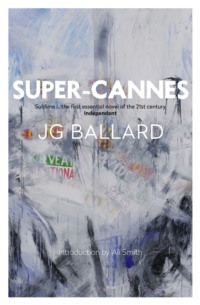
Полная версия
Super-Cannes
Despite this gaudy welcome, wealth at Eden-Olympia displayed the old-money discretion that the mercantile rich of the information age had decided to observe at the start of a new millennium. The glass and gun-metal office blocks were set well apart from each other, separated by artificial lakes and forested traffic islands where a latter-day Crusoe could have found comfortable refuge. The faint mist over the lakes and the warm sun reflected from the glass curtain-walling seemed to generate an opal haze, as if the entire business park were a mirage, a virtual city conjured into the pine-scented air like a son-et-lumière vision of a new Versailles.
But work and the realities of corporate life anchored Eden-Olympia to the ground. The buildings wore their ventilation shafts and cable conduits on their external walls, an open reminder of Eden-Olympia’s dedication to company profits and the approval of its shareholders. The satellite dishes on the roofs resembled the wimples of an order of computer-literate nuns, committed to the sanctity of the workstation and the pieties of the spreadsheet.
Gravel tore at the Jaguar’s tyres. Waking from her reverie, Jane braked sharply before we reached the gatehouse, sending the old sports saloon into a giddy shunt. Two uniformed guards looked up from their electronic screens, but Jane ignored them, readying a two-finger salute that I managed to conceal.
‘Jane, they’re on our side.’
‘Sorry, Paul. I know, we want them to like me. Open your window.’ She grimaced at herself in the rear-view mirror. ‘That cheap perfume. I smell like a tart …’
‘The most gorgeous tart on the Côte d’Azur. They’re lucky to have you.’ I tried to settle her hands as she fretted over her lipstick, obsessively fine-tuning herself. I could feel the perspiration on her wrists, brought out by more than the August sun. ‘Jane, we don’t have to be here. Even now, you can change your mind. We can drive away, cross the border into Italy, spend a week in San Remo …’
‘Paul? I’m not your daughter.’ Jane frowned at me, as if I were an intruder into her world, then touched my cheek forgivingly. ‘I signed a six-month contract. Since David died they’ve had recruitment problems. They need me …’
I watched Jane make a conscious effort to relax, treating herself like an overwrought patient in casualty. She lay against the worn leather seating, breathing the bright air into her lungs and slowly exhaling. She patted the dark bang that hid her bold forehead and always sprang forward like a coxcomb at the first hint of stress. I remembered the calm and sensible way in which she had helped the trainee nurses who fumbled with my knee-brace. At heart she was the subversive schoolgirl, the awkward-squad recruiter with a primed grenade in her locker, who saw through the stuffy conventions of boarding school and teaching hospital but was always kind enough to rescue a flustered housekeeper or ward orderly.
Now, at Eden-Olympia, it was her turn to be intimidated by the ultra-cerebral French physicians who would soon be her colleagues. She sat forward, chin raised, fingers drumming a threatening tattoo on the steering wheel. Satisfied that she could hold her own, she noticed me massaging my knee.
‘Paul, that awful brace … we’ll get it off in a few days. You’ve been in agony and never complained.’
‘I’m sorry I couldn’t help with the driving. Cannes is a long way from Maida Vale.’
‘Everywhere is a long way from Maida Vale. I’m glad we came.’ She gazed at the office buildings that climbed the valley slopes, and at the satellite dishes distilling their streams of information from the sky. ‘It all looks very civilized, in a Euro kind of way. Not a drifting leaf in sight. It’s hard to believe anyone would be allowed to go mad here. Poor David …’
David Greenwood’s death dominated our time at Eden-Olympia, hovering above the artificial lakes and forests like the ghosts of Princip over Sarajevo and Lee Harvey Oswald over Dallas. Why this dedicated children’s doctor should have left his villa on a morning in late May and set out on a murder rampage had never been explained. He had killed seven senior executives at Eden-Olympia, executed his three hostages and then turned his rifle on himself. He had written no suicide note, no defiant last message, and as the police marksmen closed in he had calmly abandoned himself to death.
A week before our wedding, Jane and I had met him at a London reception for Médecins Sans Frontières. Likeable but a little naive, Greenwood reminded me of an enthusiastic Baptist missionary, telling Jane about the superb facilities at the Eden-Olympia clinic, and the refuge for orphaned children he had set up at La Bocca, the industrial suburb to the west of Cannes. With his uncombed hair and raised eyebrows, he looked as if he had just received an unexpected shock, a revelation of all the injustices in the world, which he had decided to put right. Yet he was no prude, and talked about his six months in Bangladesh, comparing the caste rivalries among the village prostitutes with the status battles of the women executives at Eden-Olympia.
Jane had known him during their internships at Guy’s, and often met him after she enrolled with the overseas supply agency that recruited Greenwood to Eden-Olympia. When she first applied for the paediatric vacancy, I had been against her going, remembering her shock on hearing the news of Greenwood’s violent death. Although she was off-duty for the day, she had taken a white coat from the wardrobe in our bedroom and buttoned it over her nightdress as she laid the newspapers across my knees.
The entire London press made the tragedy its main story. ‘Nightmare in Eden’ was the repeated headline above photographs of Riviera beaches and bullet-starred doors in the offices of the murdered executives. Jane hardly spoke about Greenwood, but insisted on watching the television coverage of French police holding back the sightseers who invaded Eden-Olympia. Blood-drenched secretaries, too speechless to explain to the cameras how their bosses had been executed, stumbled towards the waiting ambulances, while helicopters ferried the wounded to hospitals in Grasse and Cannes.
The investigating magistrate, Judge Michel Terneau, led the inquiry, reconstructing the murders and taking evidence from a host of witnesses, but came up with no convincing explanation. Greenwood’s colleagues at the clinic testified to his earnest and intense disposition. An editorial in Le Monde speculated that the contrast between the worldly power of Eden-Olympia and the deprived lives of the Arab immigrants in Cannes La Bocca had driven Greenwood into a frenzy of frustration, a blind rage at inequalities between the first and third worlds. The murders were part political manifesto, so the newspaper believed, and part existential scream.
When the case at last left the headlines Jane never referred to Greenwood again. But when the vacancy was advertised she immediately called the manager of the supply agency. She was the only applicant, and quickly convinced me that a long break in the Mediterranean would do wonders for my knee, injured in a flying accident nine months earlier and still refusing to mend. My cousin Charles agreed to take over the publishing house while I was away, and would e-mail me copy and proof pages of the two aviation magazines that I edited.
Eager to help Jane’s career, I was happy to go. At the same time, like any husband from a different generation, I was curious about my young wife’s romantic past. Had she and Greenwood once been lovers? The question was not entirely prurient. A mass-murderer had perhaps held her in his arms, and as Jane embraced me the spirit of his death embraced me too. The widows of assassins were forever their armourers.
On our last night in Maida Vale, lying in bed with our packed suitcases in the hall, I asked Jane how closely she had known Greenwood. She was sitting astride me, with the expression of a serious-minded adolescent on her face that she always wore when making love. She drew herself upright, a hand raised to hit me, then solemnly told me that she and Greenwood had never been more than friends. I almost believed her. But some unstated loyalty to Greenwood’s memory followed us from Boulogne to the gates of Eden-Olympia.
Baring her teeth, Jane started the engine. ‘Right … let’s take them on. Find the clinic on the map. Someone called Penrose will meet us there. Why they’ve picked a psychiatrist, I don’t know. I told them you hate the entire profession. Apparently, he was hurt in David’s shoot-out, so be gentle with him …’
She steered the Jaguar towards the gatehouse, where the guards had already lost interest in their screens, intrigued by this confident young woman at the controls of her antique car.
While they checked our documents and rang the clinic I stared at the nearby office buildings and tried to imagine Greenwood’s last desperate hours. He had shot dead one of his colleagues at the clinic. A second physician, a senior surgeon, had suffered a fatal heart attack the next day. A third colleague had been wounded in the arm: Dr Wilder Penrose, the psychiatrist who was about to introduce us to our new Eden.
2 Dr Wilder Penrose
A ROBUST, BULL-BROWED man in a creased linen suit strode from the entrance of the clinic, arms raised in a boxer’s greeting. I assumed he was a local building contractor delighted with the results of his prostate test and waved back as a gesture of male solidarity. In reply, a fist punched the air.
‘Paul?’ Jane sounded wary. ‘Is that …?’
‘Wilder Penrose? It probably is. You say he’s a psychiatrist?’
‘God knows. This man’s a minotaur …’
I waited as he strode towards us, hands raised to ward off the sun. When Jane unlatched her door he swerved around the car, displaying remarkable agility for a big man. His heavy fists took on an almost balletic grace as they shaped the dusty contours of the Jaguar.
‘Magnificent … a genuine Mark II.’ He held open Jane’s door and shook her still grimy hand, then smiled good-naturedly at his oil-stained palm. ‘Dr Sinclair, welcome to Eden-Olympia. I’m Wilder Penrose – we’ll be sharing a coffee machine on the fourth floor. You don’t look tired. I assume the Jag sailed like a dream?’
‘Paul thinks so. He didn’t have to change the spark plugs every ten miles.’
‘Alas. And those twin carburettors that need to be balanced? More art than science. The old Moss gearbox? Wonderful, all the same.’ He strolled around the car and beckoned to the clouds, as if ordering them to listen to him, and declaimed in a voice not unlike my father’s: ‘Peeling off the kilometres to the tune of “Blue Skies”, sizzling down the … Nationale Sept, the plane trees going …’
‘Sha-sha-sha …’ I completed. ‘She with the Michelin beside me, a handkerchief binding her hair…’
‘Mr Sinclair?’ Leaving Jane, the psychiatrist came round to the passenger door. ‘You’re the first literate pilot here since Saint- Exupéry. Let me help you. They told me about the accident.’
His strong upper arms lifted me easily from my seat. He wore sunglasses of pale plastic, but I could see his eyes scanning my face, less interested in the minor flying injuries to my forehead than in whatever strengths and weaknesses were written into the skin. He was in his late thirties, the youngest and by far the strongest psychiatrist I had met, a giant compared with the grey-haired specialists who had examined me at Guy’s for the Aviation Licensing Board. His welcoming banter concealed a faintly threatening physical presence, as if he bullied his patients to get well, intimidating them out of their phobias and neuroses. His muscular shoulders were dominated by a massive head that he disguised in a constant ducking and grimacing. I knew that the tags we had swapped from The Unquiet Grave had not impressed him as much as the Jaguar, but then his patients were among the best-educated people in the world, and too distracted for vintage motoring.
When I swayed against the car, feeling light-headed in the sun, he raised a hand to steady me. I noticed his badly bitten fingernails, still damp from his lips, and backed away from him without thinking. We shook hands as I leaned on the door. His thumb probed the back of my hand in what pretended to be a masonic grip but was clearly a testing of my reflexes.
‘Paul, you’re tired …’ Penrose raised his arms to shield me from the light. ‘Dr Jane prescribes a strong draught of vodka and tonic. We’ll go straight to the house, with a guided tour on the way. Freshen up, and then I’ll borrow your wife and show her around the clinic. Arriving at Eden-Olympia is enough culture shock for one day …’
* * *
We settled ourselves in the car for the last lap of our journey. Penrose climbed into the rear seat, filling the small space like a bear in a kennel. He patted and squeezed the ancient leather upholstery, as if comforting an old friend.
Jane licked her thumb for luck and pressed the starter button, determined to hold her own with Penrose and relieved when the overheated engine came to life.
‘Culture shock …?’ she repeated. ‘Actually, I love it here already.’
‘Good.’ Penrose beamed at the back of her head. ‘Why, exactly?’
‘Because there isn’t any culture. All this alienation … I could easily get used to it.’
‘Even better. Agree, Paul?’
‘Totally.’ I knew Jane was teasing the psychiatrist. ‘We’ve been here ten minutes and haven’t seen a soul.’
‘That’s misleading.’ Penrose pointed to two nearby office buildings, each only six storeys high but effectively a skyscraper lying on its side. ‘They’re all at their computer screens and lab benches. Sadly, you can forget Cyril Connolly here. Forget tuberoses and sapphirine seas.’
‘I have. Who are the tenants? Big international companies?’
‘The biggest. Mitsui, Siemens, Unilever, Sumitomo, plus all the French giants – Elf-Aquitaine, Carrefour, Rhône-Poulenc. Along with a host of smaller firms: investment brokers, bioengineering outfits, design consultancies. I sound like a salesman, but when you get to know it you’ll see what a remarkable place Eden-Olympia really is. In its way this is a huge experiment in how to hothouse the future.’
I turned to glimpse a vast car park concealed behind a screen of cypresses, vehicles nose to tail like a week’s unsold output at a Renault plant. Somewhere in the office buildings the owners of these cars were staring at their screens, designing a new cathedral or cineplex, or watching the world’s spot prices. The sense of focused brainpower was bracing, but subtly unsettling.
‘I’m impressed,’ I told Penrose. ‘It beats waiting at tables or working as a checkout girl at a Monoprix. Where do you get the staff?’
‘We train them. They’re our biggest investment. It’s not so much their craft skills as their attitude to an entirely new workplace culture. Eden-Olympia isn’t just another business park. We’re an ideas laboratory for the new millennium.’
‘The “intelligent” city? I’ve read the brochure.’
‘Good. I helped to write it. Every office, house and apartment cabled up to the world’s major stockbrokers, the nearest Tiffany’s and the emergency call-out units at the clinic.’
‘Paul, are you listening?’ Jane’s elbow nudged me in the ribs. ‘You can sell your British Aerospace shares, buy me a new diamond choker and have a heart attack at the same time …’
‘Absolutely.’ Penrose lay back, nostrils pressed to the worn seats, snuffling at the old leather smells. ‘In fact, Paul, once you’ve settled in I strongly recommend a heart attack. Or a nervous breakdown. The paramedics will know everything about you – blood groups, clotting factors, attention-deficit disorders. If you’re desperate, you could even have a plane crash – there’s a small airport at Cannes-Mandelieu.’
‘I’ll think about it.’ I searched for my cigarettes, tempted to fill the car with the throat-catching fumes of a Gitanes. Penrose’s teasing was part camouflage, part initiation rite, and irritating on both counts. I thought of David Greenwood and wondered whether this aggressive humour had helped the desperate young Englishman. ‘What about emergencies of a different kind?’
‘Such as? We can cope with anything. This is the only place in the world where you can get insurance against acts of God.’
I felt Jane stiffen warningly against the steering wheel. The nearside front tyre scraped the kerb, but I pressed on.
‘Psychological problems? You do have them?’
‘Very few.’ Penrose gripped the back of Jane’s seat, deliberately exposing his bitten fingernails. At the same time his face had hardened, the heavy bones of his cheeks and jaw pushing through the conversational tics and grimaces, a curious display of aggression and self-doubt. ‘But a few, yes. Enough to make my job interesting. On the whole, people are happy and content.’
‘And you regret that?’
‘Never. I’m here to help them fulfil themselves.’ Penrose winked into Jane’s rear-view mirror. ‘You’d be surprised by how easy that is. First, make the office feel like a home – if anything, the real home.’
‘And their flats and houses?’ Jane pointed to a cluster of executive villas in the pueblo style. ‘What does that make them?’
‘Service stations, where people sleep and ablute. The human body as an obedient coolie, to be fed and hosed down, and given just enough sexual freedom to sedate itself. We’ve concentrated on the office as the key psychological zone. Middle managers have their own bathrooms. Even secretaries have a sofa in a private alcove, where they can lie back and dream about the lovers they’ll never have the energy to meet.’
We were driving along the shore of a large ornamental lake, an ellipse of glassy water that reflected the nearby mountains and reminded me of Lake Geneva with its old League of Nations headquarters, another attempt to blueprint a kingdom of saints. Apartment houses lined the waterfront, synchronized brises-soleils shielding the balconies. Jane slowed the car, and searched the windows for a single off-duty resident.
‘A fifth of the workforce live on-site,’ Penrose told us. ‘Middle and junior management in apartments and townhouses, senior people in the residential estate where you’re going. The parkland buffers the impact of all the steel and concrete. People like the facilities – yachting and water-skiing, tennis and basketball, those body-building things that obsess the French.’
‘And you?’ Jane queried.
‘Well…’ Penrose pressed his large hands against the roof, and lazily flexed his shoulders. ‘I prefer to exercise the mind. Jane, are you keen on sport?’
‘Not me.’
‘Squash, aerobics, roller-blading?’
‘The wrong kind of sweat.’
‘Bridge? There are keen amateurs here you could make an income off.’
‘Sorry. Better things to do.’
‘Interesting …’ Penrose leaned forward, so close to Jane that he seemed to be sniffing her neck. ‘Tell me more.’
‘You know …’ Straight-faced, Jane explained: ‘Wife-swapping, the latest designer amphetamines, kiddy porn. What else do we like, Paul?’
Penrose slumped back, chuckling good-humouredly. I noticed that he was forever glancing at the empty seat beside him. There was a fourth passenger in the car, the shade of a doctor defeated by the mirror-walled office buildings and manicured running tracks. I assumed that Greenwood had suffered a catastrophic cerebral accident, but one which probably owed nothing to Eden-Olympia.
Beyond the apartments was a shopping mall, a roofed-in plaza of boutiques, patisseries and beauty salons. Lines of supermarket trollies waited in the sun for customers who only came out after dark. Undismayed, Penrose gestured at the deserted checkouts.
‘Grasse and Le Cannet aren’t far away, but you’ll find all this handy. There’s everything you need, Jane – sports equipment, video-rentals, the New York Review of Books …’
‘No teleshopping?’
‘There is. But people like to browse among the basil. Shopping is the last folkloric ritual that can help to build a community, along with traffic jams and airport queues. Eden-Olympia has its own TV station – local news, supermarket best buys …’
‘Adult movies?’
Jane at last seemed interested, but Penrose was no longer listening. He had noticed a trio of Senegalese trinket salesmen wandering through the deserted café tables, gaudy robes blanched by the sun. Their dark faces, among the blackest of black Africa, had a silvered polish, as if a local biotechnology firm had reworked their genes into the age of e-mail and the intelsat. By some mix of guile and luck they had slipped past the guards at the gate, only to find themselves rattling their bangles in an empty world.
When we stopped, pointlessly, at a traffic light Penrose took out his mobile phone and pretended to speak into it. He stared aggressively at the salesmen, but the leader of the trio, an affable, older man, ignored the psychiatrist and swung his bracelets at Jane, treating her to a patient smile.
I was tempted to buy something, if only to irritate Penrose, but the lights changed.
‘What about crime?’ I asked. ‘It looks as if security might be a problem.’
‘Security is first class. Or should be.’ Penrose straightened the lapels of his jacket, ruffled by his involuntary show of temper. ‘We have our own police force. Very discreet and effective, except when you need them. These gewgaw men get in anywhere. Somehow they’ve bypassed the idea of progress. Dig a hundred-foot moat around the Montparnasse tower and they’d be up on the top deck in three minutes.’
‘Does it matter?’
‘Not in the way you mean. Though it’s irritating to be reminded of the contingent world.’
‘A drifting leaf? A passing rain-shower? Bird shit on the sleeve?’
‘That sort of thing.’ Penrose smoothed himself down, hands pressing his burly chest. ‘There’s nothing racist, by the way. We’re truly multinational – Americans, French, Japanese. Even Russians and east Europeans.’
‘Black Africa?’
‘At the senior level. We’re a melting pot, as the Riviera always has been. The solvent now is talent, not wealth or glamour. Forget about crime. The important thing is that the residents of Eden-Olympia think they’re policing themselves.’
‘They aren’t, but the illusion pays off?’
‘Exactly.’ Penrose slapped my shoulder in a show of joviality. ‘Paul, I can see you’re going to be happy here.’
The road climbed the thickly wooded slopes to the north-east of the business park, cutting off our view of Cannes and the distant sea. We stopped at an unmanned security barrier, and Penrose tapped a three-digit number into the entry panel. The white metal trellis rose noiselessly, admitting us to an enclave of architect-designed houses, our home for the next six months. I peered through the wrought-iron gates at silent tennis courts and swimming pools waiting for their owners to return. Over the immaculate gardens hung the air of well-bred catatonia that only money can buy.
‘The medical staff…?’ Jane lowered her head, a little daunted by the imposing avenues. ‘They’re all here?’
‘Only you and Professor Walter, our cardiovascular chief. Call it enlightened self-interest. It’s always reassuring to know that a good heart man and a paediatrician are nearby, in case your wife has an angina attack or your child chokes on a rusk.’
‘And you?’ I asked. ‘Who copes with sudden depressions?’
‘They can wait till morning. I’m in the annexe on the other side of the hill. North facing, a kind of shadow world for the less important.’ Penrose beamed to himself, happy to speak frankly. ‘The company barons who decide our pecking order feel they’re beyond the need of psychiatric attention.’
‘Are they?’
‘For the time being. But I’m working on it.’ Penrose sat up and pointed through the plane trees. ‘Slow down, Jane. You’re almost home. From now on you’re living in a suburb of paradise …’
Конец ознакомительного фрагмента.
Текст предоставлен ООО «ЛитРес».
Прочитайте эту книгу целиком, купив полную легальную версию на ЛитРес.









